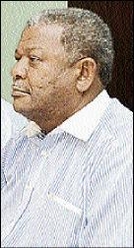Antiguan opposition party renews anti-IMF position
Published: Wednesday | September 16, 2009

Spencer
ST JOHN'S, Antigua (CMC):
The main opposition Antigua Labour Party (ALP) has renewed its call for the government not to enter into any agreement with the International Monetary Fund (IMF) and has called for the removal of the Baldwin Spencer administration from office.
"The only responsible thing that can and should be done now is to remove every member of the UPP (United Progressive Party) from office. This we must do now somehow before our country is taken further into the valley of darkness.
"Every person needs to heed this warning. No matter your position in this society. The creations of inequities in our society can lead to a volatile community. There is no safety in volatility," said ALP leader Lester Bird in his weekly radio broadcast on Sunday night.
Last month Spencer dismissed a call by Bird for his administration to reduce the price of fuel as well as rescinding the decision to seek support from the IMF on that same date.
Fuel cost
"The government does not control the cost of diesel, gasolene or cooking gas from their various sources," Spencer said, noting that his administration had been subsidising the price for a number of years," said
Spencer, who made reference to "Venezuela's compassionate assistance of US$50 million" and China's consideration of a soft loan to assist the island in the present economic crisis.
"On the international stage, participating countries in the G20 Summit in London in early April pledged US$500 billion to the IMF for providing assistance to low- and middle-income countries on restructured and compassionate conditionalities.
"This represents another source of funding we are exploring in order to relieve the hardship with which we have to cope," Spencer said.
Bird said that the socio-economic policies of the Spencer administration had brought the country to the brink of being bankrupt and, as a result, is in no position to negotiate with the Washington-based financial institution over a rescue package that would not contain harsh economic measures.
Bitter measures
He told listeners that Haiti, the Dominican Republic and Dominica had experienced the bitter measures of the IMF.
"The IMF is not a development institution. It is not, nor has it ever been a conduit for resource to be transferred from richer nations of this world to poorer ones. It is and has always been a lender of last resort.
"In other words, when a country has reached a position of financial crisis, as we have, and have no money and no one will lend it any, and then the IMF will assist on its terms.
"Never in the history of man has the IMF been praised for its policies associated with lending. At best, its policies have been regarded the necessary restrictions and impositions to curb the financial mismanagement of the nation that seeks its assistance," Bird said.
He warned that one of the first conditionalities of the IMF on developing countries is the need to pay off foreign debt as well as selling off state-owned assets.
"This is often called privatisation. It creates an influx of revenue that can be used to pay off foreign debt. The problem is that the assets become someone else's and run for the benefit of its new owners who, invariably will be foreign companies," he said, warning Antiguans that they should also brace for a reduction in the size of the public sector, an increase in income tax as well as a reduction, if not complete removal, of tax-free concessions to private sector investors".
Bird, a former prime minister, said while he agreed that the economy is 'broken' the blame should be put squarely on the shoulders of the government that first came to office in 2004 and "found a country with the second highest per capita income in the Caribbean".
Bird accused the government of implementing policies that have ruined the country and that citizens could look to the IMF website for themselves regarding the country's economic position.
"Some people have misguidedly swallowed the UPP propaganda that other OECS countries have also approached the IMF for help.
"But there is a big difference between what St Lucia, St Vincent, St Kitts and Grenada have done and what Antigua and Barbuda is doing. In the case of the other OECS countries, they have approached the IMF for very limited assistance in the context of three special windows that the IMF opened. These relate to help after natural disasters and help to ameliorate the effects of the present global crisis."
Bird said that in the case of Antigua and Barbuda, the government is seeking a full structural adjustment programme that would have a serious impact on the citizens.

















